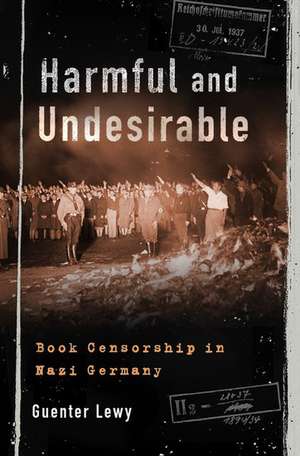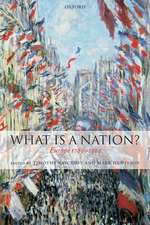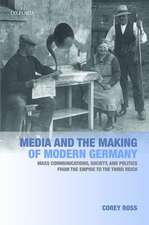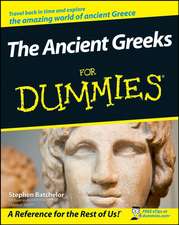Harmful and Undesirable: Book Censorship in Nazi Germany
Autor Guenter Lewyen Limba Engleză Hardback – 13 aug 2016
| Toate formatele și edițiile | Preț | Express |
|---|---|---|
| Paperback (1) | 160.44 lei 11-16 zile | |
| Oxford University Press – 17 sep 2020 | 160.44 lei 11-16 zile | |
| Hardback (1) | 249.20 lei 32-37 zile | |
| Oxford University Press – 13 aug 2016 | 249.20 lei 32-37 zile |
Preț: 249.20 lei
Preț vechi: 290.69 lei
-14% Nou
Puncte Express: 374
Preț estimativ în valută:
47.69€ • 49.27$ • 39.67£
47.69€ • 49.27$ • 39.67£
Carte tipărită la comandă
Livrare economică 10-15 martie
Preluare comenzi: 021 569.72.76
Specificații
ISBN-13: 9780190275280
ISBN-10: 0190275286
Pagini: 280
Ilustrații: 23 photographs
Dimensiuni: 160 x 236 x 23 mm
Greutate: 0.54 kg
Editura: Oxford University Press
Colecția OUP USA
Locul publicării:New York, United States
ISBN-10: 0190275286
Pagini: 280
Ilustrații: 23 photographs
Dimensiuni: 160 x 236 x 23 mm
Greutate: 0.54 kg
Editura: Oxford University Press
Colecția OUP USA
Locul publicării:New York, United States
Recenzii
This is a welcome, thoroughly researched, persuasively argued, and highly illuminating account of the Third Reichs efforts to exercise book censorship to implement Nazi cultural policy... Lewys fine study may now be the best for understanding Nazi book censorship from the top down.
Lewy's innovative narrative succeeds in its investigation of such a complex issue. This short book would be a welcome addition to graduate level (and possibly advanced undergraduate) seminars on intellectual life in Nazi Germany, particularly for classes that want to consider implementation as well as ideology. Harmful and Undesirable: Book Censorship in Nazi Germany will also inform researchers working on Nazi intellectual culture particularly the history of reading during the Third Reich.
Recommended.
An intriguing, in-depth study of Nazi efforts to control every aspect of the printed word, from book burning to all forms of surveillance. This highly intelligent work brings light to a previously neglected field, in part of uncomfortable relevance. The author, a seasoned historian, concentrates on individuals, including Nazi chieftains who delighted in fighting each other.
Guenter Lewy has written the first thoroughly documented and highly readable history of an aspect of Nazi rule hardly dealt with up to now. Harmful and Undesirable is an essential contribution to the history of the Third Reich.
Nazi censorship was different from censorship in other totalitarian regimes, but it has escaped so far the attention of English language historiography. Professor Lewy's important study is therefore most welcome.
This admirably written book can be read both as a comprehensive history of National Socialist censorship and as a more abstract study of bureaucracy in the Third Reich ... readers will enjoy a large number of surprising details and observations on issues such as self-censorship, paper shortages and economic mechanisms of the German book market.
Lewy's emphasis on overlapping and conflicting authorities provides a concise case study of the broader scholarly view of the polycracy of the Third Reich and demonstrates how censorship could, at times, remain effective, despite these interagency conflicts. A strength of the book is the level of detail Lewy provides
Lewy's innovative narrative succeeds in its investigation of such a complex issue. This short book would be a welcome addition to graduate level (and possibly advanced undergraduate) seminars on intellectual life in Nazi Germany, particularly for classes that want to consider implementation as well as ideology. Harmful and Undesirable: Book Censorship in Nazi Germany will also inform researchers working on Nazi intellectual culture particularly the history of reading during the Third Reich.
Recommended.
An intriguing, in-depth study of Nazi efforts to control every aspect of the printed word, from book burning to all forms of surveillance. This highly intelligent work brings light to a previously neglected field, in part of uncomfortable relevance. The author, a seasoned historian, concentrates on individuals, including Nazi chieftains who delighted in fighting each other.
Guenter Lewy has written the first thoroughly documented and highly readable history of an aspect of Nazi rule hardly dealt with up to now. Harmful and Undesirable is an essential contribution to the history of the Third Reich.
Nazi censorship was different from censorship in other totalitarian regimes, but it has escaped so far the attention of English language historiography. Professor Lewy's important study is therefore most welcome.
This admirably written book can be read both as a comprehensive history of National Socialist censorship and as a more abstract study of bureaucracy in the Third Reich ... readers will enjoy a large number of surprising details and observations on issues such as self-censorship, paper shortages and economic mechanisms of the German book market.
Lewy's emphasis on overlapping and conflicting authorities provides a concise case study of the broader scholarly view of the polycracy of the Third Reich and demonstrates how censorship could, at times, remain effective, despite these interagency conflicts. A strength of the book is the level of detail Lewy provides
Notă biografică
Guenter Lewy is Professor Emeritus of Political Science at the University of Massachusetts. His books include The Catholic Church and Nazi Germany and The Nazi Persecution of the Gypsies, the recipient of a prize from the German Studies Association.














